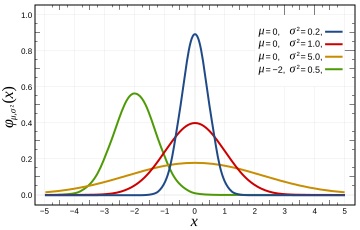Gaussian function is a function of the below form

a, b, c and d are arbitrary real constants. The graph of a Gaussian is a characteristic symmetric "bell curve" shape that quickly falls off.
The parameters
- a is the height of the curve's peak
- b is the position of the center of the peak
- c (the standard deviation, sometimes called the Gaussian RMS width) controls the width of the "bell"
- d is the value that the function asymptotically approaches far from the peak (in practice d is often set to 0)
Two-dimensional Gaussian function
In two dimensions, the power to which e is raised in the Gaussian function is any negative-definite quadratic form. Consequently, the level sets of the Gaussian will always be ellipses.
- A is the amplitude
- xo,yo is the center
- σx, σy are the x and y spreads of the blob

No comments:
Post a Comment